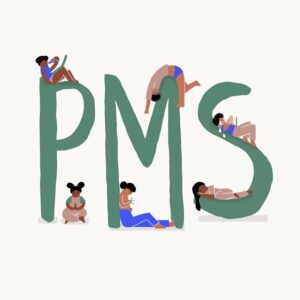PMS (premenstrual syndrome) is a common, unpleasant experience that many women go through every month. While there isn’t always an easy answer for what causes PMS, there are plenty of ways to cope with it. Learn about the different symptoms of PMS and how you can deal with them.
Contents
What is PMS Depression?

PMS Depression is a type of depression that can be caused by premenstrual syndrome (PMS). Symptoms of PMS Depression include feelings of sadness, emptiness, loneliness, irritability, and difficulty concentrating.
This type of depression can be particularly severe during the premenstrual phase (before ovulation), but it can also occur at any time during a woman’s menstrual cycle. Treatment for PMS Depression typically involves medication and therapy.
Many things can cause depression, and it is important to get help if you are feeling depressed. You can talk to your doctor or mental health professional about your symptoms and see if there is anything that can be done to improve them.
The Different Types of PMS Depression
There are many different types of PMS depression, and each one has its own set of symptoms. If you’re struggling with depressive symptoms during your period, it’s important to remember that there is more than one type of PMS depression. You don’t have to live with this mood forever – some treatments can help you feel better again. Here are the different types of PMS depression:
1. Menstrual Cramps Depression (MCD)
MCD is the most common type of PMS depression, and it’s characterized by feelings of sadness, hopelessness, and dread. Symptoms often start around the time your period is supposed to start, and they get worse as your period progresses. MCD can affect both women and men, but it’s particularly common in women who have a history of anxiety or mood disorders.
2. Premenstrual Syndrome With Anxiety (PMS-A)
PMS-A is a form of PMS that’s also associated with anxiety symptoms. People with PMS-A usually experience intense anxiety before their period starts, along with other symptoms like insomnia, headaches, and fatigue.
3. Premenstrual Syndrome Without Anxiety (PMS-W)
PMS-W is a form of PMS that’s rare but can be very serious. People with PMS-W usually don’t have any anxiety symptoms, but they may experience depression, mood swings, and appetite changes.
4. Late-Stage Premenstrual Syndrome (LSPM)
LSPM is the most severe form of PMS depression, and it’s often accompanied by serious physical symptoms like weight gain, bloating, and headaches. LSPM can seriously interfere with your ability to function day-to-day, and it’s usually only diagnosed after other forms of PMS depression have been treated unsuccessfully.
If you’re struggling with depressive symptoms during your period, it’s important to reach out for help. There are treatments available that can help you feel better again.
Symptoms of PMS Depression

PMS is a time of the month when many women experience mood changes and physical symptoms. For some, it can be a very challenging time. While PMS is not a mental illness, some women may experience symptoms that are similar to those of depression.
If you’re feeling down and have been struggling to function during your period, there are some things you can do to get help. Here are seven signs that you might be suffering from PMS depression:
You feel hopeless and helpless
One of the most common symptoms of PMS depression is feelings of hopelessness and helplessness. You may feel like you can’t fix your problems, and you may start to feel like a failure.
You lose interest in activities you used to enjoy
PMS depression can make it difficult to concentrate, think clearly, or engage in any activities that you used to enjoy. You may find that you don’t want to do anything, or that you only want to do easy things.
You have a change in appetite
Many women experience a change in appetite during their PMS period – they may eat more than usual or feel like they can’t stop eating. This can lead to weight gain and general body fat accumulation.
You have difficulty concentrating or making decisions
Another common symptom of PMS depression is difficulty concentrating. You may find that you’re having trouble focusing on anything, and you may even have trouble making decisions.
You have feelings of sadness, loneliness, and irritability
PMS can make you feel very sad and lonely. You may also experience increased levels of irritability, which can lead to arguments with loved ones or difficulty getting along with others.
You have trouble sleeping or staying awake
Sometimes, PMS depression can lead to problems sleeping. You may find that you can’t get into a deep enough sleep, or that you have nightmares or other sleep disturbances.
If you’re struggling with depressive symptoms during your period, it’s important to reach out for help. There are treatments available that can help you feel better again.
How to Get Relief from PMS Depression?

If you are feeling down during your monthly cycle, there is a good chance that you are experiencing premenstrual syndrome (PMS). PMS is a common condition that affects around one in four women. It is characterized by mood swings, bloating, irritability, and a reduced sex drive. While it is not life-threatening, PMS can be very disruptive and cause significant personal distress. Fortunately, there are ways to get relief from PMS depression. Below we will discuss the most effective methods for treating PMS depression.
The first step is to identify the root cause of the depression. If it is due to hormonal imbalances, then correcting those imbalances will often lead to quick relief from the depression. Some of the most common causes of PMS depression include low estrogen levels, an imbalance of progesterone and testosterone levels, and thyroid problems. If you believe that your depression is caused by a hormone imbalance, then consult with your doctor to get started on the appropriate treatment plan.
Many natural remedies are effective in alleviating PMS depression. These remedies typically involve altering diet or exercise habits to restore balance to the hormones in the body. Many people find that following a healthy, balanced diet and incorporating regular exercise into their routine helps to improve their overall mood and relieve symptoms of PMS depression.
Some of these natural remedies are:
Eat a balanced diet
When you eat a balanced diet, you are providing your body with the nutrients it needs to function properly. This includes plenty of fruits, vegetables, and whole grains. Foods that are high in estrogens, such as dairy products and red meat, should be avoided during PMS because they can raise levels of estrogen in the body.
Take Supplements
Supplementing with natural remedies like magnesium and omega-3 fatty acids can also be beneficial in relieving symptoms of PMS depression. Magnesium is an important mineral for regulating hormones in the body, and omega-3 fatty acids have been shown to improve mood and relieve symptoms of PMS depression.
Exercise
Regular exercise has many benefits for overall health, including relief from symptoms of this depression. Exercise helps to increase endorphins, which are neurotransmitters that promote feelings of happiness and well-being. Exercise also increases the production of oxytocin, which is a hormone responsible for calming down emotions. Combining exercise with a healthy diet is often the most effective way to treat this depression.
Have Support
Getting support from friends and family can be invaluable in the treatment of this depression. Talking to someone about your experiences and feelings can help to relieve some of the stress associated with the condition. Additionally, seeking out complementary therapies like massage or acupuncture can be very helpful in relieving symptoms of PMS depression.
take steps to Address the Root Cause
If your depression is due to a hormone imbalance, then correcting that imbalance will often lead to quick relief from the depression. If you are not sure whether your depression is caused by a hormonal imbalance, then consult with your doctor. In either case, following a healthy, balanced diet and incorporating regular exercise into your routine can be very beneficial in relieving symptoms of PMS depression. Additionally, seeking out complementary therapies like massage or acupuncture can be very helpful.
If you are experiencing signs and symptoms of PMS depression, seek out help from a qualified health professional. There are many effective natural remedies available for treating PMS depression, and following a healthy diet and regular exercise can also be very helpful.
Conclusion
There’s no one-size-fits-all answer to the question of what to do about PMS depression, as everyone experiences it differently. However, some tips that may help include: eating a balanced diet, getting enough sleep, managing stress levels, exercising regularly, and drinking plenty of fluids. If you find that these measures don’t alleviate your symptoms completely or if they come back after a short period, speak with your doctor about possible treatments.
Hope this article was of help to you! If you are suffering from mental health disorders, you may seek help from Therapy Mantra. We have a team of highly trained and experienced therapists who can provide you with the tools and skills necessary for overcoming mental health disorders. Contact us today to schedule an online therapy or download our free Android or iOS app for more information.


